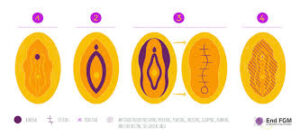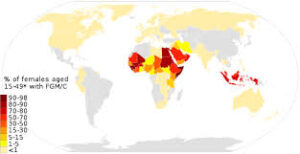Female genital mutilation (FGM)-


Female genital mutilation (FGM), also known as female genital cutting (FGC) or female circumcision, refers to the partial or total removal of external female genitalia or other injury to female genital organs for non-medical reasons. This practice is recognized internationally as a violation of the human rights of girls and women.
Here are some details about female genital mutilation:
Types of FGM:

There are four main types of FGM, as categorized by the World Health Organization (WHO):
I: Clitoridectomy – Partial or total removal of the clitoris and/or the prepuce (clitoral hood).
II: Excision – Partial or total removal of the clitoris and the labia minora, with or without excision of the labia majora.
III: Infibulation – Narrowing of the vaginal opening through the creation of a covering seal, formed by cutting and repositioning the labia minora and/or labia majora, with or without removal of the clitoris.
IV: Other harmful procedures – This category includes all other harmful procedures to the female genitalia for non-medical purposes, such as pricking, piercing, incising, scraping, or cauterization.
Female genital mutilation (FGM) – Symptoms –

The symptoms of female genital mutilation (FGM) can vary depending on the type of FGM performed, the individual’s health, and any complications that may arise.
Here are some common symptoms associated with FGM:
1. Immediate Symptoms:
Severe pain during the procedure.
Bleeding, both during and after the procedure.
Shock due to pain and trauma.
Infection: There is a risk of infection due to unsterilized instruments or unsanitary conditions during the procedure.
2. Short-Term Symptoms:
– Swelling of the genital area.
– Difficulty in passing urine or painful urination.
– Painful menstruation due to scarring and narrowing of the vaginal opening.
– Wound healing complications.
3. Long-Term Symptoms:
– Chronic pain: Scarring and nerve damage from the procedure can lead to chronic pain in the genital area.
– Urinary problems: Narrowing of the urethra or urinary tract infections can occur.
– Sexual problems: FGM can cause pain during intercourse (dyspareunia) and decreased sexual pleasure.
– Psychological effects: FGM can cause psychological trauma, including depression, anxiety, and post-traumatic stress disorder (PTSD).
– Obstetric complications: Women who have undergone FGM may experience difficulties during childbirth, including prolonged labor, tearing of scar tissue, and increased risk of maternal and infant mortality.
It’s important to note that the severity of symptoms can vary widely among individuals, and not all women who have undergone FGM will experience all of these symptoms.
Additionally, some symptoms may not manifest until later in life, such as during puberty, sexual activity, or childbirth.
If you or someone you know is experiencing symptoms related to FGM, it is essential to seek medical attention from a healthcare provider who is knowledgeable about FGM and its associated health issues.
Treatment may involve addressing immediate complications, managing long-term health effects, and providing psychological support for survivors.
Female genital mutilation (FGM) Health Consequences:

Female genital mutilation (FGM) can have profound and often lifelong impacts on the physical, sexual, reproductive, and mental health of women and girls.
Here’s a detailed overview of how FGM affects women’s health:
1. Physical Health Effects:


Immediate Complications: These can include severe pain, bleeding, shock, and infections. Immediate complications can arise from the procedure itself due to the use of unsterilized instruments or unsanitary conditions.
Long-Term Complications: FGM can lead to a range of long-term physical health issues, including:
– Chronic pain: Scarring and nerve damage from FGM can cause chronic pain in the genital area.
– Urinary problems: Narrowing of the urethra, urinary tract infections, and urinary retention can occur.
– Menstrual problems: FGM can lead to difficulties in menstruation, including painful periods and obstruction of menstrual flow.
Sexual problems: FGM can cause pain during intercourse (dyspareunia), decreased sexual pleasure, and decreased sexual satisfaction.
Obstetric complications: Women who have undergone FGM are at higher risk of experiencing complications during childbirth, such as prolonged labor, perineal tears, and increased risk of maternal and infant mortality.
2. Reproductive Health Effects:
Fertility issues: FGM can lead to difficulties with conception due to scarring and obstruction of the reproductive organs.
– Obstetric complications: As mentioned earlier, women who have undergone FGM are at increased risk of complications during childbirth, which can affect both maternal and infant health.
– Psychological effects on reproductive health: FGM can lead to psychological trauma, anxiety, and depression, which can impact reproductive health decisions and outcomes.
3. Sexual Health Effects:

Painful intercourse: FGM can cause pain during sexual intercourse, which can lead to sexual dysfunction and decreased sexual satisfaction.
– Decreased sexual desire: Some women who have undergone FGM may experience decreased sexual desire or aversion to sexual activity due to pain or psychological trauma.
– Relationship problems: FGM can strain intimate relationships and marriages due to sexual difficulties and emotional distress.
4. Psychological Health Effects:

Psychological trauma: FGM can cause psychological trauma, including anxiety, depression, post-traumatic stress disorder (PTSD), and other mental health issues.
– Low self-esteem: Women who have undergone FGM may experience feelings of shame, guilt, and low self-esteem due to their experiences.
– Social isolation: FGM can lead to social stigma and discrimination, which can contribute to social isolation and lack of support.
Overall, FGM has serious and multifaceted impacts on women’s health, affecting physical, sexual, reproductive, and psychological well-being. Addressing FGM requires a comprehensive approach that includes medical care, psychosocial support, education, advocacy, and community engagement to prevent and eliminate this harmful practice and support survivors.
Prevalence:

FGM is practiced in various parts of the world, particularly in Africa, the Middle East, and Asia.
It is prevalent in certain communities, cultures, and religious groups. According to the WHO, over 200 million girls and women alive today have undergone FGM, and it is estimated that approximately 3 million girls are at risk of undergoing the procedure every year.
Legal and Human Rights Perspective:

FGM is recognized internationally as a violation of the human rights of girls and women.
Many countries have enacted laws prohibiting the practice and have adopted measures to prevent and eliminate FGM.
However, enforcement of these laws and efforts to change cultural attitudes and practices vary widely.
Efforts to Eliminate FGM:
Various international organizations, governments, non-governmental organizations (NGOs), and community-based initiatives are working to eliminate FGM through education, advocacy, legislation, and community engagement. These efforts aim to raise awareness about the harmful effects of FGM, empower communities to abandon the practice, provide support to survivors, and promote gender equality and women’s rights.
Awareness days related to Female Genital Mutilation (FGM)-


There are several awareness days related to Female Genital Mutilation (FGM) that aim to draw attention to this harmful practice, raise awareness about its consequences, and promote efforts to eliminate it.
Some of these awareness days include:
1. International Day of Zero Tolerance for Female Genital Mutilation:
Observed on February 6th each year, this day was established by the United Nations to raise awareness about FGM and to promote its eradication.
It serves as a reminder of the global commitment to eliminate this harmful practice.
2. International Day of the Girl Child:
Celebrated on October 11th, this day focuses on promoting the rights of girls worldwide and addressing the challenges they face, including gender-based violence and harmful practices like FGM.
3. International Women’s Day:
Observed on March 8th, International Women’s Day is a global celebration of the social, economic, cultural, and political achievements of women.
It also serves as a platform to advocate for gender equality and women’s rights, including the elimination of harmful practices like FGM.
4. 16 Days of Activism Against Gender-Based Violence:
This international campaign runs from November 25th (International Day for the Elimination of Violence Against Women) to December 10th (Human Rights Day).
During these 16 days, various organizations and individuals work to raise awareness about gender-based violence, including FGM, and to advocate for solutions to end it.
5. Orange the World Campaign:
As part of the 16 Days of Activism Against Gender-Based Violence, the Orange the World campaign calls for action to end violence against women and girls.
Orange is used as a symbol of a brighter future without violence.
This campaign often includes initiatives to raise awareness about FGM and advocate for its elimination.
6. Local and National Awareness Events:
In addition to these international awareness days and campaigns, many countries and communities also organize local and national events to raise awareness about FGM, educate the public about its harmful effects, and promote efforts to prevent and eliminate it.
These events may include seminars, workshops, conferences, cultural performances, and advocacy campaigns.
Participation in these awareness days and campaigns helps to mobilize individuals, communities, governments, and organizations around the world to take action against FGM and support survivors.
By raising awareness and promoting dialogue, these initiatives contribute to the global movement to end this harmful practice and protect the rights and well-being of girls and women everywhere.
In summary, female genital mutilation is a harmful practice that involves the partial or total removal of external female genitalia or other injury to female genital organs for non-medical reasons.
It is recognized internationally as a violation of human rights and can have serious health consequences.
Efforts to eliminate FGM involve a multi-faceted approach, including legal measures, advocacy, education, and community engagement.
For more women’s related info visit here also – https://womaniyas.com/2024/03/02/shortened-menstrual-cycle-or-frequent-periods/
